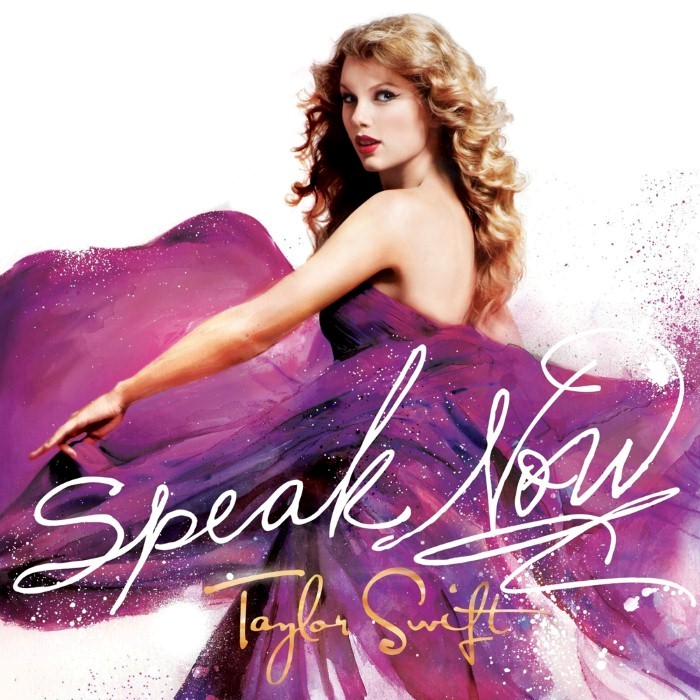Speak Now by Taylor Swift

Speak Now is the third studio album by American singer–songwriter Taylor Swift, released on October 25, 2010, by Big Machine Records. Production for the album took place during 2008 to 2010 at several recording studios, and was handled by Swift and country music producer Nathan Chapman. Written entirely by Swift as the follow-up to Fearless (2008), Speak Now expands on the country pop style of her previous work, and features lyrical themes concerning love, romance and heartbreak. A deluxe edition was released on the same day exclusively to US Target stores; it contained three extra bonus tracks and two acoustic versions as well as a pop remix of "Mine". Internationally, another deluxe edition was released containing the same three bonus songs and acoustic songs, and three US versions. In 2012, the Target exclusive was released to a wider distribution in the US. Six singles were released from the album. "Mine" was released as the lead single on August 4, 2010 instead of August 16 due to it leaking online prior to its release. The second single, "Back to December", was released on November 11, 2010. The third single, "Mean", was released on March 7, 2011 and a little over a month later on April 19, 2011 the fourth single, "The Story of Us", was released only to mainstream radio. The fifth single, "Sparks Fly" was released on July 18, 2011 and was the first single since "You Belong with Me" to reach number one on Billboard Hot Country Songs chart. The final single "Ours" was released as promotional single on November 8, 2011 and was released to country radio on December 5, 2011 and was the second single from Speak Now to peak at number one on the Hot Country Songs chart. Speak Now received generally positive reviews from music critics, who complimented Swift's songwriting and themes. The album debuted at number one on the US Billboard 200 chart, selling approximately 1,047,000 units in its first week. Due to strong digital sales, all 14 songs from the standard edition of the album charted on the Billboard Hot 100, with the lead single "Mine" having the highest peak of number three. The album was also an international success, charting within the top 10 in several countries, including Australia, Canada, and the United Kingdom. Swift promoted the album with an international tour, Speak Now World Tour, throughout 2011. According to Swift's label Big Machine Records, as of September 2011, Speak Now has sold over five million copies worldwide. The album has been certified quadruple platinum by the Recording Industry Association of America (RIAA) and, as of October 2012, has sold 4.2 million copies in the United States.
“Real life is a funny thing, you know,” Taylor Swift wrote in the liner notes of 2010’s <i>Speak Now</i>, her third album and the third she’s re-recorded as part of a sweeping effort to regain her master tapes. “There is a time for silence. There is a time for waiting your turn. But if you know how you feel, and you so clearly know what you need to say, you’ll know it.” Swift was in her early twenties when she wrote <i>Speak Now</i>, still finding her voice as an artist and as an adult. But she’s faithful to her originals here—all of them written on her own, on tour, without co-writers—and faithful to a much younger version of herself. She pays tribute to early influences like Fall Out Boy and Paramore’s Hayley Williams, teaming up with them on the reimagined “from the vault” tracks “Electric Touch” and “Castles Crumbling”, respectively. And though she swaps Nashville producer Nathan Chapman for more recent collaborators Jack Antonoff and Aaron Dessner, the arrangements are still warm and clear—minus a coat of varnish or two—with an eye towards the sort of all-encompassing pop she’d inevitably, wholeheartedly embrace. We all know what came next for Swift with 2012’s <i>Red</i>, but, looking back, you can easily see and hear what’s on the horizon in these songs. The grace of <i>Speak Now</i> is in how it makes simple work out of feelings that are anything but. Swift is vulnerable here, but she’s also self-empowered (“Mean”). She’s innocent, but knows when to take responsibility (“Dear John”). She’s wise enough to regret her mistakes (“Back to December”), but not too jaded see the best in people (“Innocent”). Does she want to grow up? Yes, if that means more agency and independence (“Speak Now”). But when you’re all alone in that new apartment, you still might cry—not just for the childhood home you left, but for the knowledge that you can never go back (“Never Grow Up”). The sound is big, but the details are extremely specific—at one point, Swift says her rival thinks she’s crazy because Swift likes to rhyme her name with things (pop-punk blowout “Better Than Revenge”). It’s that balance—the universal and the specific, the accessible and the obscure—that not only sets Swift apart from most contemporary pop songwriters, but makes her a guide for anyone trying to sort out the impossible avalanche of feelings early adulthood brings. Not that you have to be a teenager to resonate with her. If anything, what makes Swift special is her hunch that everyone has had their turn at the heartache she writes about, whether they’re ready to admit it or not. In her liner notes for <i>Fearless</i>, she described the power of believing in Prince Charmings and happily-ever-afters. On <i>Speak Now</i>, most of the Prince Charmings turn out to be duds, and the real happily-ever-after is the wisdom and resilience you find in falling for them anyway.
